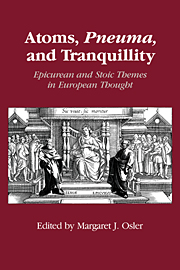Book contents
- Frontmatter
- Contents
- List of contributors
- Acknowledgments
- Introduction
- 1 Ethics and logic in Stoicism
- 2 Medieval connectives, Hellenistic connections: the strange case of propositional logic
- 3 Stoic psychotherapy in the Middle Ages and Renaissance: Petrarch's De remediis
- 4 Alonso de Cartagena and John Calvin as interpreters of Seneca's De clementia
- 5 The Epicurean in Lorenzo Valla's On Pleasure
- 6 Seneca's role in popularizing Epicurus in the sixteenth century
- 7 Stoic contributions to early modern science
- 8 Fortune, fate, and divination: Gassendi's voluntarist theology and the baptism of Epicureanism
- 9 Epicureanism and the creation of a privatist ethic in early seventeenth-century France
- 10 Robert Boyle on Epicurean atheism and atomism
- 11 Stoic and Epicurean doctrines in Newton's system of the world
- 12 Locke, Willis, and the seventeenth-century Epicurean soul
- 13 The Epicurean new way of ideas: Gassendi, Locke, and Berkeley
- 14 The Stoic legacy in the early Scottish Enlightenment
- Index
8 - Fortune, fate, and divination: Gassendi's voluntarist theology and the baptism of Epicureanism
Published online by Cambridge University Press: 13 November 2009
- Frontmatter
- Contents
- List of contributors
- Acknowledgments
- Introduction
- 1 Ethics and logic in Stoicism
- 2 Medieval connectives, Hellenistic connections: the strange case of propositional logic
- 3 Stoic psychotherapy in the Middle Ages and Renaissance: Petrarch's De remediis
- 4 Alonso de Cartagena and John Calvin as interpreters of Seneca's De clementia
- 5 The Epicurean in Lorenzo Valla's On Pleasure
- 6 Seneca's role in popularizing Epicurus in the sixteenth century
- 7 Stoic contributions to early modern science
- 8 Fortune, fate, and divination: Gassendi's voluntarist theology and the baptism of Epicureanism
- 9 Epicureanism and the creation of a privatist ethic in early seventeenth-century France
- 10 Robert Boyle on Epicurean atheism and atomism
- 11 Stoic and Epicurean doctrines in Newton's system of the world
- 12 Locke, Willis, and the seventeenth-century Epicurean soul
- 13 The Epicurean new way of ideas: Gassendi, Locke, and Berkeley
- 14 The Stoic legacy in the early Scottish Enlightenment
- Index
Summary
Pierre Gassendi (1592–1655) is most frequently remembered for introducing the philosophy of the ancient atomist Epicurus into the mainstream of European thought. Gassendi's version of Epicurean atomism and his adaptation of Epicurean hedonism exerted major influences on seventeenth-century developments in science and political philosophy. Before European intellectuals could embrace the philosophy of Epicurus, however, his views had to be purged of the accusations of atheism and materialism that had followed them since antiquity. Gassendi, a Catholic priest, assumed the task of baptizing Epicurus by identifying the theologically objectionable elements in his philosophy and modifying them accordingly. For example, he denied the Epicurean doctrines of the eternity of the world, the infinitude of atoms, the mortality of the human soul, and the existence of the clinamen, or swerve, which Epicurus had introduced in order to account for the impact of atoms in an infinite universe and for the freedom of the human will.
Gassendi's Syntagma philosophicum assumes the form of a traditional “complete” philosophy in three parts, respectively entitled “Logic,” “Physics,” and “Ethics.” It contains a thorough exposition of philosophy and the history of philosophy. Gassendi's virulent anti-Aristotelianism, evident in his first published work, the Exercitationes paradoxicae adversus Aristoteleos (1624), makes it clear that one of his aims in the Syntagma philosophicum was to produce a complete alternative to Aristotelianism in order to provide foundations for the new science. He did so by endorsing a Christianized version of Epicureanism, in which he intended to discuss all of the traditional issues in philosophy – logical, natural, and moral.
- Type
- Chapter
- Information
- Atoms, Pneuma, and TranquillityEpicurean and Stoic Themes in European Thought, pp. 155 - 174Publisher: Cambridge University PressPrint publication year: 1991
- 4
- Cited by



